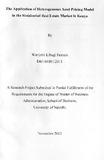| dc.description.abstract | This project assesses the applicability of heterogeneous asset pricing model in pricing
heterogeneous assets, with specific examination of the Kenyan residential real estate
market. Each of the three primary methods for pricing residential real estate assets –
income, cost and sales comparable approaches – is susceptible to bias. This project
therefore, mainly seeks to establish an alternative methodology with view to reducing
subjectivity of the pricing process. The study also has a secondary objective of assessing
how heuristic biases influence the pricing process leading to subjectivity. The study uses
case study design, specifically Nairobi City residential real estate market, from where a
sample is drawn and survey done.
Methodological comparisons are made in the study of pricing of residential real estate
market. Using a few residential properties from Nairobi City, the prices are independently
estimated using the three traditional approaches. The prices of the selected properties are
then estimated using heterogeneous asset pricing model in its simplest form, to test its
applicability. This allows a controlled cross-methodology comparison of results.
The results indicate that, heterogeneous asset pricing model is applicable in pricing of
residential real estate assets in Kenya thus confirming the hypothesis of the study. The
study also indicate that stereotypes, aversion to ambiguity, conservatism are some of the
psychological bias that influence the pricing process of residential real estate assets. For
instance, conservatism is seen where valuers fail to undertake fresh market analysis and
continue to use comparables of sales made in the past. The study therefore concluded that the pricing of heterogeneous asset pricing model is applicable and if well modeled and
controlled, it has better results. The study recommends policy and academia review to
base pricing of residential real estate assets on concepts of price distributions, pricing
models and prediction error analysis. Further, the study recommends that the
psychological bias should be identified and valuers trained on how to deal with them so
as to reduce the subjectivity in pricing of heterogeneous real estate assets. | en |

